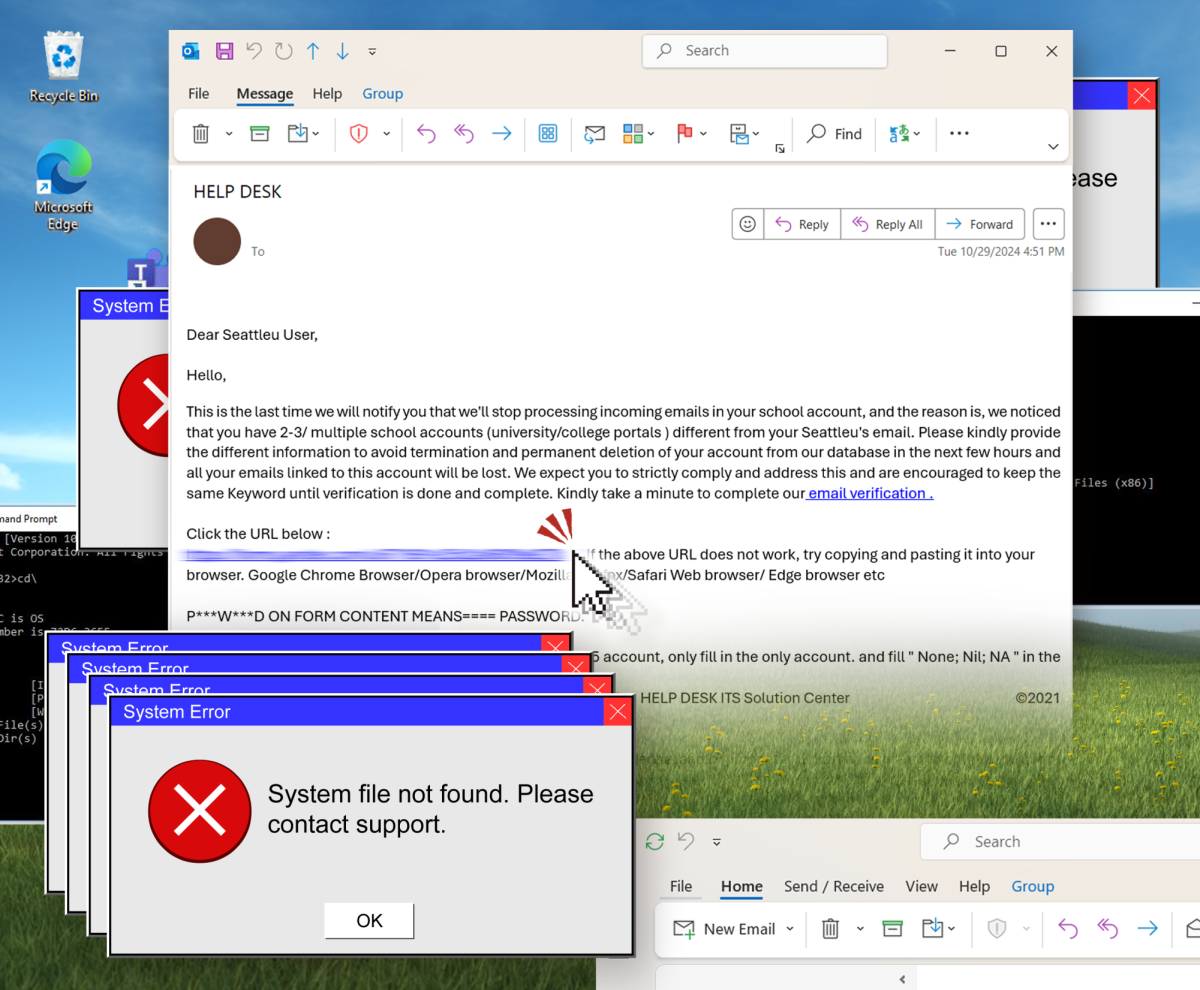In recent months, Seattle University students and staff have noticed a sudden increase in phishing emails sent to their university email addresses. According to the FBI, phishing scams are aimed at capturing personal information like passwords, bank information and social security numbers. This information falling into the wrong hands can have disastrous consequences for students, including financial loss and identity theft.
A popular tactic scammers have utilized is presenting fake job opportunities, preying on students who may be seeking employment. It was this style of email that Keemora Flowers, a second-year communication and media major, nearly fell victim to.
Flowers, like many other students, had been job hunting recently. Because of this, receiving a job offer in her email didn’t set off any alarms. The offer was very appealing, describing a job with flexible hours, high pay and the ability to work from home. Included in the email was a Google form asking for fairly basic information, including the school Flowers attended, her phone number and who she banked with.
“I had applied because it sounded like a very easy job. It sounded too good to be true,” Flowers said. “The process was so easy. I was feeling like, ‘Wow, this is kind of cool.’”
Feeling hopeful about the opportunity she had been presented with, Flowers submitted the form and awaited their response.
The next morning, Flowers awoke to two emails; an acceptance letter from the “company” she had applied to, and a warning from Seattle U’s Information Technology (IT) department about job offers that seemed too good to be true.
“The follow-up email was worse. It was telling me they needed my bank information, my routing number and my social security,” Flowers said. “If I didn’t see the email [from IT], I probably would have continued.”
Flowers remarked that she had noticed a massive uptick in scam emails compared to last year.
“Last year I didn’t get any phishing emails,” she said. “I got similar emails that were actually directly from the school, like job applications and people I knew on campus who were leaders of the communication and media internship program.”
Because of this, Flowers assumed that her university email would be protected from scams and had no reason not to trust the email she received.
First-year Political Science Major Cris Rosales found himself in a similar situation. The email Rosales received appeared to come from the university and warned him that if he didn’t respond, all accounts associated with him would be deleted. The wording was urgent and seemed accurate, so, like Flowers, he clicked on the link that was sent to him.
“They asked for my password and my emails, and I’m like ‘Oh, that’s kind of weird,’” Rosales said. “But I give it to them because I’m trustful like that. I saw it in my school email, so I was like, ‘Ok, it’s from the school.’”
By the time Rosales noticed there were Russian characters in the form he was sent, it was too late. A few days later, he could no longer access his account. He tried to reset his password but was blocked from doing so. After a weekend of stress, Rosales was able to reach out to the IT department which helped him retrieve his account.
Rosales also received a warning about scam emails, but in his case, it was too late.
“It’d be hard to call [the warnings from the university] effective or not, because how would you know which people are getting the emails at what time? I’m pretty sure the scams were not a mass thing, it was an individual thing. So I think it was kind of hard to get the timing right,” he said.
Some, like First-year Marketing Major Via Tay, were lucky enough to receive the warning emails before any phishing emails. While the communication from the university helped Tay to be more aware of potential scams, they feel that more could be done to increase awareness.
“Not a lot of us check our emails regularly,” Tay admitted. “That information is easy to miss. I think if they used a different avenue to communicate that this was happening, that would have been a lot better.”
Tay recommended that the university utilize the public safety text message alerts that are sent out when there’s danger on or near campus. Flowers agreed, saying she’d like to see physical posters up around campus spreading the word.
We reached out to the IT department to hear more about their plans going forward, but were unable to schedule an interview. For now, it’s important to remain cautious of any emails that seem suspiciously promising or urgent as well as keeping an eye out for further communication from IT.
“If it’s too good to be true, it’s too good to be true,” Tay advised.
Regardless of the content of the email, never share personal information like passwords or bank details. If you fall victim to one of these scams, reach out to the IT service desk as soon as possible to secure or recover your accounts.








